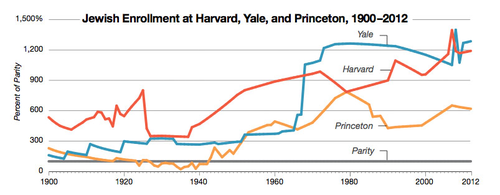Sandbox
Corrupt Ivy League admissions?
Writing last year, in the American Conservative (The myth of American meritocracy: How corrupt are Ivy League admissions?, 28 November 2012) Rob Unz claimed that today's Asian students were now being discriminated against in ways that Jewish students had been in the past. Namely, despite growing numbers in the population and impressive academic accomplishments, their share of the admissions to top institutions was being restricted by quotas. Furthermore, Unz went on to assert that Jewish students are now actually over-represented relative to equally qualified Asians and non-Jewish whites. Unz's article includes various statistical graphics to support these claims; for example, see

At the time of the article, a blog post by Andrew Gelman asked, Should Harvard start admitting kids at random? (28 November 2012). Subsequently, Gelman and others were led to re-examine the Unz data, and found that many of the earlier claims do not stand up. Most recently, in Ivy Jew update (22 October 2013), he quotes Nurit Baytch:
Unz’s conclusion that Jews are over-admitted to Harvard was erroneous, as he relied on faulty assumptions and spurious data: Unz substantially overestimated the percentage of Jews at Harvard while grossly underestimating the percentage of Jews among high academic achievers.
This post has a number of interesting quotations, that are worth bearing in mind when looking at any statistical claim:
- "My take on all this is that it can be harder than it looks to do research using statistics."
- "It’s perfectly natural to get excited when one’s initial hypothesis is confirmed by an examination of some data, but the next step is to recognize that these exciting discoveries do not always hold up."
Regarding the particular analysis in question, Gelman writes
Unz, who spends so much of his time in the political arena, is used to politically-motivated criticisms and responds in kind, and so I think he sees the statistics provided by Mertz and Baytch as attacks to be dodged or parried rather than as useful information that can help him modify his understanding of the world. But for those of us how are not so invested in a particular position, Baytch’s article, and Mertz’s from a few months ago, should be helpful to anyone interested in further study of ethnicity and high-end college admissions.
In a related post My beef with Brooks: the alternative to “good statistics” is not “no statistics,” it’s “bad statistics” (20 February 2013), Gelman takes columnist David Brooks to task for adopting an "anti-data" posture in a column last year.
Submitted by Paul Alper